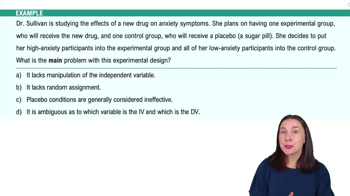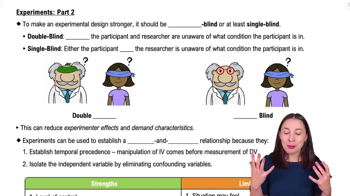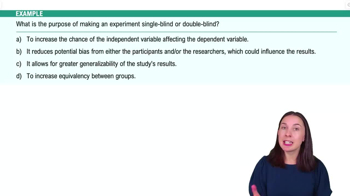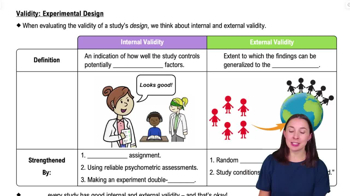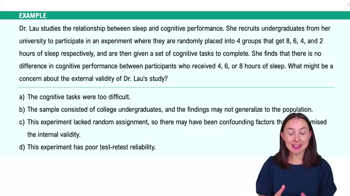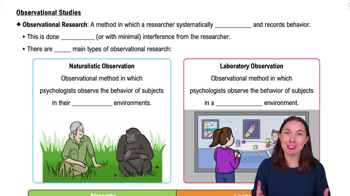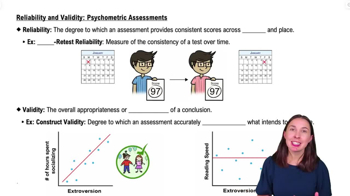Table of contents
- 1. Introduction to Psychology1h 43m
- 2. Psychology Research2h 20m
- 3. Biological Psychology2h 41m
- 4. Sensation and Perception28m
- 5. Consciousness and Sleep32m
- 6. Learning41m
- 7. Memory34m
- 8. Cognition37m
- 9. Emotion and Motivation35m
- 10. Developmental Psychology33m
- 11. Personality48m
- 12. Social Psychology41m
- 13. Stress and Health41m
- 14. Psychological Disorders44m
- 15. Treatment47m
2. Psychology Research
Intro to Research Methods
Struggling with Psychology?
Join thousands of students who trust us to help them ace their exams!Watch the first videoMultiple Choice
Out of all the research methods used in psychology, why are experiments particularly useful at making causal claims?
A
Experiments involve the use of large samples and utilize reliable and valid measures.
B
Experiments isolate the independent variable and control for confounding variables.
C
Experiments are designed so that the independent variable always precedes the dependent variable.
D
Both b and c are correct.
 Verified step by step guidance
Verified step by step guidance1
Understand the purpose of experiments in psychology: Experiments are designed to test hypotheses by manipulating one or more variables to determine their effect on other variables.
Identify the key components of an experiment: The independent variable (IV) is what the researcher manipulates, and the dependent variable (DV) is what is measured. The goal is to see if changes in the IV cause changes in the DV.
Recognize the importance of controlling confounding variables: Confounding variables are other factors that might affect the DV. By controlling these, experiments can more accurately determine the causal relationship between the IV and DV.
Acknowledge the temporal precedence in experiments: Experiments are structured so that the manipulation of the IV occurs before any changes in the DV are measured, establishing a cause-and-effect relationship.
Conclude why experiments are useful for causal claims: By isolating the IV, controlling confounding variables, and ensuring temporal precedence, experiments provide strong evidence for causality, which is why both options b and c are correct.

 1:46m
1:46mWatch next
Master Roadmap of the Lesson with a bite sized video explanation from Hannah Gordils
Start learningRelated Videos
Related Practice










